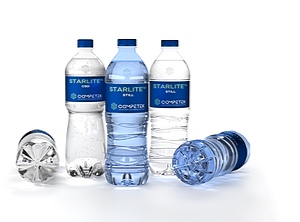COMPETEK
Technology said to make PET bottles lighter, cheaper / Can work with recycled materials
 The process can reportedly cut 1g from a 0.5 litre bottle. (Photo: Competek) |
France’s Competek (Salles-d’Angles; www.competek.com) says it has devised a technology to reduce the weight of 0.5 litre and 1.5 litre PET bottles by 1 gram and 2 grams, respectively. The packaging solutions firm is a collaboration between PET Engineering and Comep, which was taken over by French blow moulding machine maker Sidel (Octeville-sur-Mer; www.sidel.com) in 2019 (see Plasteurope.com of 26.07.2019).
According to the company, the technology is also compatible with 100% recycled materials and combines two solutions, Sidel’s “Starlite” process and Competek’s “Supervent” procedure. Startlite is said to reduce the bottle’s weight and enhance performance by increasing its resistance and stability once palletised, while Supervent reportedly improves the release of air to cut the pressure required for blow moulding.
The process technology is said to be adaptable to PET bottles of up to 2.5 litres for carbonated products and 5 litres for flat products. The company noted that it expects the technology will help cut material use and save between EUR 1 and EUR 2 for each 1,000 bottles manufactured, leading to a reduction of 2.4 kg to 4.8 kg of CO2 per 1,000 bottles.
According to the company, the technology is also compatible with 100% recycled materials and combines two solutions, Sidel’s “Starlite” process and Competek’s “Supervent” procedure. Startlite is said to reduce the bottle’s weight and enhance performance by increasing its resistance and stability once palletised, while Supervent reportedly improves the release of air to cut the pressure required for blow moulding.
The process technology is said to be adaptable to PET bottles of up to 2.5 litres for carbonated products and 5 litres for flat products. The company noted that it expects the technology will help cut material use and save between EUR 1 and EUR 2 for each 1,000 bottles manufactured, leading to a reduction of 2.4 kg to 4.8 kg of CO2 per 1,000 bottles.
23.08.2021 Plasteurope.com [248346-0]
Published on 23.08.2021
